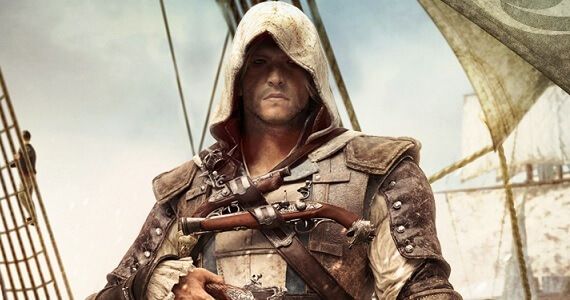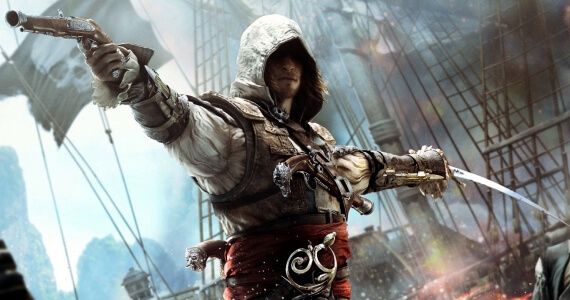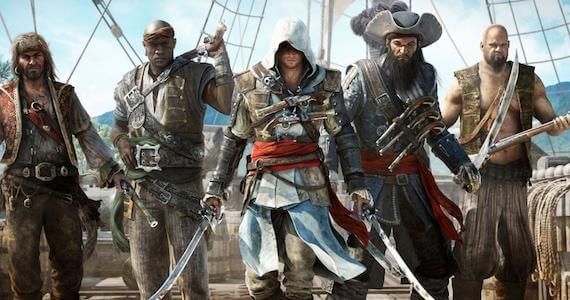There was a time before Assassin's Creed came to Ubisoft, but at this point, hardly anyone can remember it. For the latest installment, the studio has turned from sprawling cities to the Caribbean Sea circa 1715, casting players into the Golden Age of Pirates of Assassin's Creed 4: Black Flag.
With a new hero, a new, genuinely open world and a completely new realm of characters, Black Flag will likely surprise even dedicated fans - charting a new course for the franchise in the process.
Few franchises have come to embody ongoing debates among critics and gamers alike as much as Assassin's Creed's annual release cycle. Ubisoft's sci-fi/historical adventure series came by its success honestly, launching a truly original IP and polishing outdoing themselves in a sequel. But after spin-offs left gamers craving the next step forward for the franchise, Assassin's Creed 3 didn't quite live up to the hype.
The marketing campaign for AC3 was one for the ages, but with a protagonist that failed to connect with fans as Ezio Auditore had, and an open world that paled in comparison to competitors, many questioned if the enthusiasm surrounding the upstart franchise was beginning to wane.
It was that climate that Assassin's Creed IV: Black Flag strode into, bearing the craved number in its title, but with little emphasis placed on its connection to the larger franchise or the Assassins themselves. Even so, pirates are pirates, and if Ubisoft wanted to take the incredibly promising naval sections of AC3's campaign and build a game around it, fans would likely remain in attendance. The publisher made the message perfectly clear when they admitted they weren't expecting the game to outsell its predecessor, but after playing Black Flag for ourselves, we're not so sure we agree.
Any modern gamer knows that a story-based adventure is only as good as its protagonist, and in the case of Edward Kenway, the amount of praise and hyperbole thrown around wasn't a bit misleading. Kenway might have had a good reason for leaving Wales for a life on the sea, but it's clear from the game's opening mission that Edward lacks the selfless morals of Ezio Auditore completely (and Connor Kenway would absolutely hate him).
Admittedly, the realm of piracy makes creating colorful characters a bit easier; but from Edward to the surrounding cast, the hero's circle of infamous friends (both fictional and historical) is filled with well-written roles, well-acted. The wealth of 'larger than life' characters may blend together, but the decision to capture both voice and performances for Black Flag was a wise one. The story may not reinvent the genre of high seas adventure, but the writers kept to their word of giving pirates 'the HBO treatment.'
But as much as diehard fans might be dying to know what answers Black Flag offers for the overall story of Assassin/Templar conflict (and it offers them, revealing Desmond Miles' fate and that of a few other characters), a majority of those excited for the game are eager to do one thing: jump on their own ship, and hit the high seas for a life of pirating. And in that regard, the developers haven't cut any corners.
The digital Caribbean Sea is as big as players would hope, and capable of being sailed across from the very first time Edward steps up to helm of his private sloop, the Jackdaw. Developer videos have shown the impressive graphics and physics that make a realistic pirate simulation possible, shifting seamlessly from sailing, to engaging another ship, boarding, and capturing. But the wealth of small touches and sound design throughout are just as impactful (the shanties sung by your ship's crew for instance, with additional songs sprinkled as collectibles throughout the game's environments).
What must be praised every bit as much as the visuals is the progression system disguised beneath a simulated scattering of islands. With the map's population of waterborne enemies - ranging from gunboats to full-blown warships - divided by difficulty, the progression promised by creative director Ashraf Ismail pairs with the story beautifully. As the story demands Edward move into more dangerous waters, the Jackdaw must be upgraded to remain more than splinters. And doing that requires some serious time spent pirating.
It would be enough to say that the exploration, diving, and dozens of other activities is treated with care and detail, but the fact that it is completely unheard of in the Assassin's Creed series is what makes the execution so surprising. With the larger population centers of Havana and Kingston recalling the settlements of AC3's America, and hidden ruins challenging players to master stealth, players are able to tailor their path through the main story like never before.
Unfortunately, without overhauling or reinventing the core combat and traversal systems, many of the same nagging issues and frustrations remain. The traversal and combat is lifted almost entirely from AC3, most impressive when navigating the wilder regions of the Caribbean Islands. But drop into a tense or challenging mission in a crowded market, and the awkward traversal returns.
At this point, those admittedly irritating moments seem to stem from a technical limitation, and the developers have clearly heard the complaints. Easing the requirements for eavesdropping and tailing missions show player feedback put into practice, and the new mission rating system lets players communicate even more directly (a system we hope to see adopted by more developers).
More than anything, it is absolutely baffling that this game was released just one year after AC3 - the game Ubisoft claimed their top designers had been hand-crafting while other teams handled the spin-offs. Some glitches or hiccups were fully expected in the shift to an aquatic open world, but the finished product is seamless, groundbreaking, and immensely refreshing.
Even the modern plot created around Abstergo Entertainment seems to spawn from a renewed enthusiasm from Ubisoft Montreal to silence their critics. The less said about that side of the story the better, but the commentary offered on interactive entertainment in today's world is aimed squarely at their gaming audience. It's neither rife with in-jokes nor 'meta,' and a welcome change in perspective on the Templar/Assassin conflict.
'Refreshing' could be applied to several aspects of the game's design, with performances and an attention to detail that place it among - if not ahead - of the franchise's best. And with no discernible shortcomings when placed next to its American-Revolution-predecessor, Black Flag is the step into next-gen that many fans have been waiting for.
_____
Assassin’s Creed 4: Black Flag will is available now for the Xbox 360, PS3, PC and Wii U. Next-gen releases arrive with their respective consoles. Game Rant played the Xbox 360 version.
Follow Andrew on Twitter @andrew_dyce.



